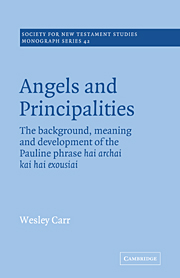 Angels and Principalities
Angels and Principalities Published online by Cambridge University Press: 06 January 2010
Jewish thought
It is not the intention of this section to attempt a full account of Jewish angelogy and demonology. Questions of origins do not arise, for we are concerned with the Jewish background only in so far as it may have affected Paul's concept of the powers.
The concept of angelic or demonic beings was part of Hebrew thought in the earliest periods, but it appears not to have been a formative influence in the development of Hebrew religion. Angels appear in the significant notion of the court of Yahweh. The only reference in pre-exilic prophecy is found in Hos. 12: 4, where the man of Gen. 32: 24, who wrestled with Jacob, has become an angel. The sons of God in Gen. 6: 2, who play so prominent a part in later thinking, seem to become angels through the influence of the translators of the LXX. On the demonic side certain monsters such as Azazel (Lev. 16) and Lilith (Is. 34: 14) survive, but are only connected with a multitude of demons much later in the tradition.
During and after the exile there was considerable development of the concept. But even here in the canonical material angels and demons play a relatively small part. The heavenly court recurs in the prologue to Job and in the early parts of Ezekiel. The main function of an angel is still that of representing Yahweh, and often the two persons are confused.
To save this book to your Kindle, first ensure [email protected] is added to your Approved Personal Document E-mail List under your Personal Document Settings on the Manage Your Content and Devices page of your Amazon account. Then enter the ‘name’ part of your Kindle email address below. Find out more about saving to your Kindle.
Note you can select to save to either the @free.kindle.com or @kindle.com variations. ‘@free.kindle.com’ emails are free but can only be saved to your device when it is connected to wi-fi. ‘@kindle.com’ emails can be delivered even when you are not connected to wi-fi, but note that service fees apply.
Find out more about the Kindle Personal Document Service.
To save content items to your account, please confirm that you agree to abide by our usage policies. If this is the first time you use this feature, you will be asked to authorise Cambridge Core to connect with your account. Find out more about saving content to Dropbox.
To save content items to your account, please confirm that you agree to abide by our usage policies. If this is the first time you use this feature, you will be asked to authorise Cambridge Core to connect with your account. Find out more about saving content to Google Drive.